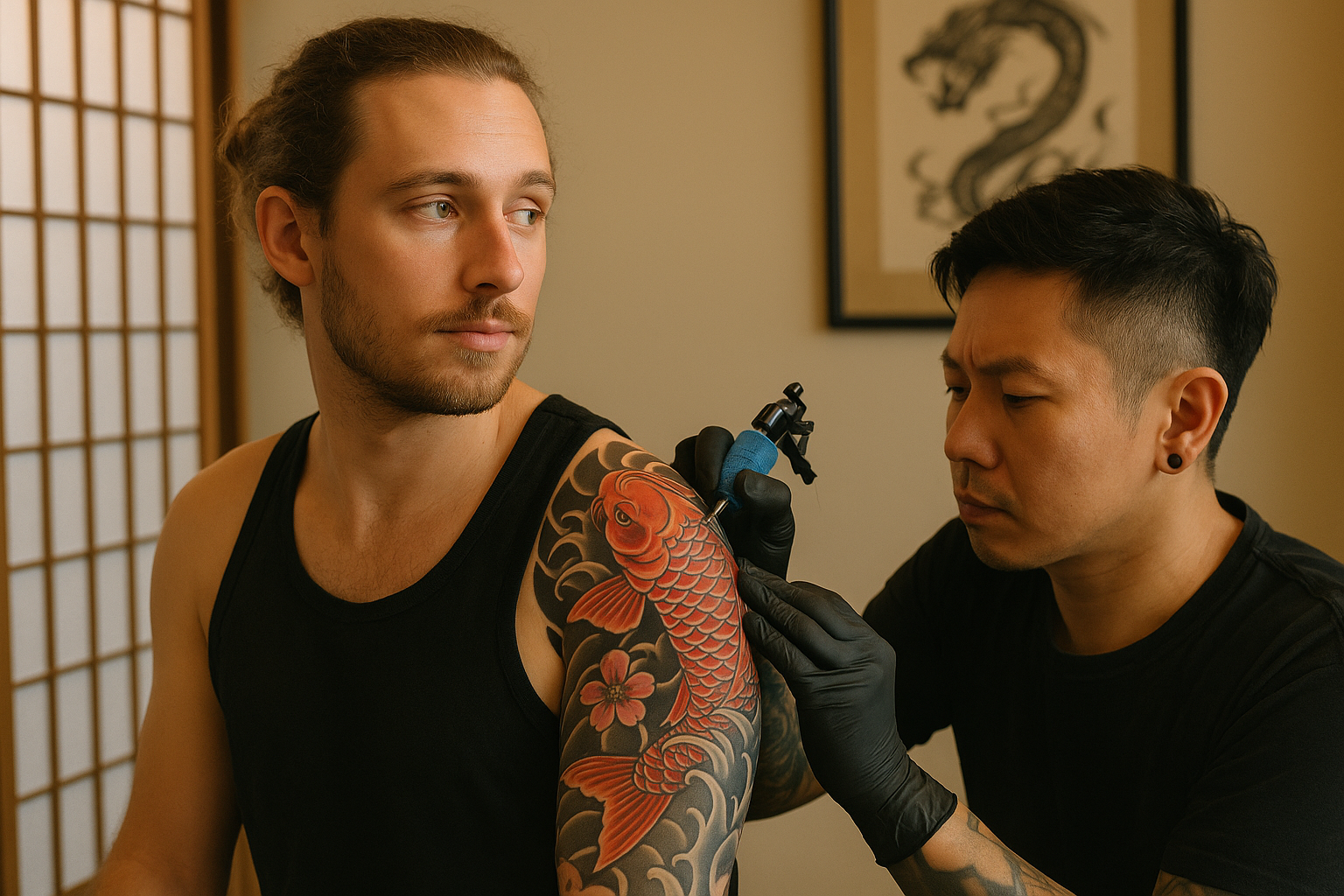You love the look. The dragons. The koi. The full-back power pieces inked like armor. But the question keeps whispering:
Can I, as a non-Japanese person, actually get an Irezumi tattoo? Or is it disrespectful?
You’re not alone. If you’re drawn to the intensity and symbolism of traditional Japanese tattoos but don’t want to cross a cultural line, this post is for you. We asked real artists—including those trained in traditional tebori and modern Irezumi styles—what they really think when a foreigner walks in asking for ink steeped in centuries of Japanese tradition.
💡 First, What Exactly Is Irezumi?
“Irezumi” (入れ墨) literally means “inserting ink.” It refers to the traditional Japanese tattooing practice dating back to the Edo period. These tattoos aren’t just aesthetic—they’re layered with symbolism, spiritual meanings, and once even criminal status.
Common motifs include:
- Koi fish (courage + perseverance)
- Dragons (wisdom + power)
- Oni (demons or protectors)
- Hannya masks (female rage + sorrow)
- Peonies and cherry blossoms (beauty + impermanence)
Done traditionally, Irezumi is painstakingly hand-poked (tebori), though many artists now use machines while honoring the visual style and storytelling form.
🧭 So, Can Non-Japanese People Get Irezumi?
✅ The Short Answer: Yes — But Know What You’re Wearing.
Most Japanese tattoo artists don’t mind foreign clients requesting Irezumi. In fact, many welcome it—especially those working internationally or with an appreciation for cross-cultural art.
But here’s the unfiltered truth:
“Irezumi is not cosplay.”
— Rin, Tokyo-based tattoo artist
Irezumi isn’t just ink. It’s myth, memory, and meaning. So before you wear a dragon on your back or a Hannya mask across your ribs, understand what you’re claiming.
🎙️ What Tattoo Artists Really Say
We reached out to artists in Japan, the US, and Europe. Here’s what they had to say:
🔹 Takeshi – Osaka, Japan
“Foreigners are respectful when they ask first. The problem is not ‘getting Irezumi.’ The problem is when they mix it with things that don’t make sense, like combining a samurai with Aztec patterns.”
Key Takeaway: Mixing cultures without understanding the root meaning is where it starts to feel like appropriation.
🔹 Kimiko – Los Angeles, CA
“I love tattooing non-Japanese clients. But I explain every symbol. If they just want it because it ‘looks cool,’ I won’t do it.”
Key Takeaway: Aesthetics are powerful—but your intent matters just as much.
🔹 Vincent – Paris, France
“When I do Japanese-style full sleeves, I always build a story. You don’t just throw koi, geisha, and tigers together. It has to flow, like a scroll.”
Key Takeaway: True Irezumi tells a story. If you want it, be ready to respect the narrative.
✋ What NOT to Do (If You Respect the Culture)
- ❌ Don’t treat Irezumi like a random sticker tattoo
- ❌ Don’t mash Japanese elements with pop culture “just because it looks sick”
- ❌ Don’t get sacred motifs without learning their meaning (e.g., Fudo Myo-o or Hannya)
- ❌ Don’t wear the tattoos into onsens (hot springs) in Japan—most still ban tattooed bodies
🧠 How to Do It Right (Even If You’re Not Japanese)
Here’s what artists and wearers say makes all the difference:
1. Study the Symbols
Learn what the koi, the waves, the peonies mean. Irezumi is a language—and you should know what you’re saying on your skin.
2. Choose a Respectful Artist
Find someone trained in Irezumi or who honors its compositional structure. Bonus points if they take the time to ask about your story too.
3. Be Ready to Commit
Irezumi isn’t small, trendy, or minimalist. It’s usually bold, large-scale, and highly visible. This is armor. Not accessories.
👘 Can You Get a Geisha Tattoo If You’re Not Japanese?
Yes—but again, know what you’re symbolizing. Geisha tattoos often represent feminine power, grace, and mystery, but they’ve also been misunderstood or eroticized through Western eyes.
So ask yourself:
Are you honoring the archetype—or just aestheticizing someone else’s culture?
🔥 The Final Word: Respect Isn’t Limiting. It’s Empowering.
Wanting an Irezumi tattoo means you already feel something deeper—about myth, strength, transformation. That’s not appropriation. That’s resonance.
But that feeling? It has to be matched with respect.
If you’re willing to learn, to listen, and to wear the story with reverence—not just style—then yes, you can absolutely get Irezumi.
📸 Image Insert Suggestion:
A back-facing portrait of a non-Japanese woman with a full Irezumi backpiece in muted ink tones. She stands in soft light, robe half-fallen. Text overlay:
“Not Born Into It. Still Chose the Fire.”
🛍️ Want a Way to Wear the Spirit Without the Lifetime Commitment?
Explore our Irezumi-inspired t-shirts, layered with dragons, waves, Hannya masks, and silent commands.
Designed for bold women who rise louder than shame.


Leave a comment
Your email address will not be published. Required fields are marked *
You must be logged in to post a comment.